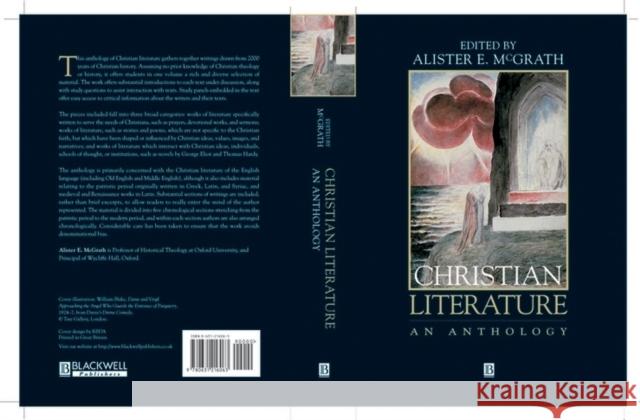Christian Literature » książka



Christian Literature
ISBN-13: 9780631216063 / Angielski / Miękka / 2000 / 816 str.
Christian Literature
ISBN-13: 9780631216063 / Angielski / Miękka / 2000 / 816 str.
(netto: 249,15 VAT: 5%)
Najniższa cena z 30 dni: 259,47
ok. 30 dni roboczych.
Darmowa dostawa!
This anthology of Christian literature gathers together writings drawn from 2000 years of Christian history.
Wydanie ilustrowane
"Pastors who want sermon illustrations to be more than vignettes, teachers who introduce Western literary, church or spiritual history, and readers who want new ideas for a book club will all find Alister McGrath′s
Christian Literature anthology accessible, helpful and affordable. McGrath really has done a commendable job in pulling together most of the best in a pedagological framework that is helpful to student and teacher alike."
Robbie Castleman, National Co–ordinator, The Religious & Theological Studies Fellowship
"I am profoundly grateful for this book, which sets out to introduce students to primary texts across a vast spectrum of literature. The basic layout of each chapter is clear and helpful and the ′Questions for Discussion′ are sharp and should focus reading appropriately. In short, this is a very useful workhorse of a book, a way into the riches of literature and a careful guide to the difficult field of literature and theology." David Jasper, Theology
"The provision of clear and succinct introductory summaries of the historical and social context to which writers belonged should prove of considerable worth." The Expository Times
"This large anthology gathers a rich, varied and wisely selected sampling of texts drawn from writings spanning Christianity′s two millennia. Helpful contextualising and interpretive introductions to each period and each text, along with study and discussion questions, render the collection reader friendly." Religious Studies Review
Preface.
How to Use This Work.
The Structure of the Work.
Part I: The Patristic Period c.100–600:.
Introduction.
Clement of Rome.
The Martyrdom of Polycarp.
Irenaeus of Lyons (c.130–c.200).
Quintus Septimius Florens Tertullian (c.160–c.225).
Eusebius of Caesarea (c.260–340).
Athanasius of Alexandria (c.296–373).
Ephramium the Syrian (303–73).
Cyril of Jerusalem (c. 315–87).
Gregory of Nyssa (c.330–c.395).
The Peregrinnation of Egeria (c.384).
Augustine of Hippo (354–430).
Part II: English and Irish Sources c.600–1050:.
Introduction.
Caedmon′s Hymn (c.670).
Bede (c.673–735).
The Deer′s Cry (c.700).
The Dream of the Rood.
The Junius Code.
The Exeter Book Riddles.
The Blicking Homilist.
Aelfric.
Wulfstan.
Part III: The Middle Ages, 1050–1500: .
Introduction.
Anselm of Canterbury.
Peter Abelard.
Ancrene Wisse: Guide for an Anchoress.
Thomas Aquinas.
Hugh of Balma.
Dante Aligheri.
The Cloud of Unknowing.
William Langland.
Geoffrey Chaucer.
Julian of Norwich.
The York Mystery Plays.
Thomas à Kempis.
William Dunbar.
Part IV: Renaissance and Reformation, 1500–1700:.
Introduction.
Erasmus of Rotterdam.
Martin Luther.
Ignacious Loyola.
John Calvin.
John Foxe.
Edmund Spenser.
The King James Version of the Bible.
Sir Walter Raleigh.
Lancelot Andrewes.
John Donne.
George Herbert.
Sir Thomas Browne.
John Milton.
Henry Vaughan.
Andrew Marvell.
Blaise Pascal.
John Bunyan.
The Book of Common Prayer.
Part V: The Modern Period 1700–2000:.
Introduction.
Joseph Addison.
Daniel Defoe.
Joseph Butler.
Jonathan Edwards.
John Wesley.
C Wesley.
John Newton.
William Paley.
William Wordsworth.
Samuel Taylor Coleridge.
John Keble.
Ralph Waldo Emerson.
Anthony Trollope.
Benjamin Jowett.
George Eliot.
Fyodor Mikhailivich Dostoevsky.
Matthew Arnold.
Thomas Hardy.
Gerald Manley Hopkins.
Gilbert Keith Chesterton.
T. S. Eliot.
Dorothy L. Sayers.
C. S. Lewis.
Graham Greene.
Martin Luther King.
David Lodge.
Garrison Keillor.
A Glossary of Terms.
Sources of Extracts.
For Further Reading.
Acknowledgments.
Index.
Alister E McGrath is Professor of Historical Theology at Oxford University, and Principal of Wycliffe Hall, Oxford.
This anthology of Christian literature gathers together writings drawn from 2000 years of Christian history. Assuming no prior knowledge of Christian theology or history, it offers students in one volume, a rich and diverse selection of material. The work offers substantial introductions to each text under discussion, along with study questions to assist interaction with texts. ′Study Panels′ embedded in the text offer easy access to critical information about the writers and their texts.
The pieces included fall into three broad categories: works of literature specifically written to serve the needs of Christians – such as prayers, devotional works, and sermons; works of literature, such as stories and poems, which are not specific to the Christian faith, but which have been shaped or influenced by Christian ideas, values, images, and narratives; and works of literature which interact with Christian ideas, individuals, schools of thought, or institutions, such as novels by George Eliot and Thomas Hardy.
The anthology is primarily concerned with the Christian literature of the English language (including Old English and Middle English), although it also includes material relating to the patristic period originally written in Greek, Latin and Syriac, and medieval and Renaissance works in Latin. Substantial sections of writings are included, rather than brief excerpts, to allow readers to really enter the mind of the author represented. The material is divided into five chronological sections stretching from the patristic period to the modern period, and within each section authors are also arranged chronologically. Considerable care has been taken to ensure that the work avoids denominational bias.
1997-2026 DolnySlask.com Agencja Internetowa
KrainaKsiazek.PL - Księgarnia Internetowa









